|
Butch Berman
Berman Memorial
NJO Russ Long Tribute
Tomfoolery
Memorial for Earl May
|
|
March 2008
Feature Articles
Music news, interviews, opinion, memorials
|
|
|
BMF to keep Butch's
memory alive
By Tom Ineck
LINCOLN, Neb.—The Berman Music
Foundation lost its guiding light and
most passionate supporter when Butch
Berman died Jan. 31.
More
than simply the founder of the BMF,
Butch was a veteran rocker and a friend
to musicians and non-musicians alike. A
master of networking, Butch touched so
many lives in so many ways during his
brief 58 years that it is impossible to
document his impact in one story.
In an
attempt to do him justice, we at the
Berman Music Foundation will keep
Butch’s memory alive by continuing to do
interviews with the rock musicians with
whom he played, the jazz artists who
experienced his generosity and
friendship and others whom he met and
developed friendships with in every
aspect of his life.
Bill
Dye,
a guitarist now living in
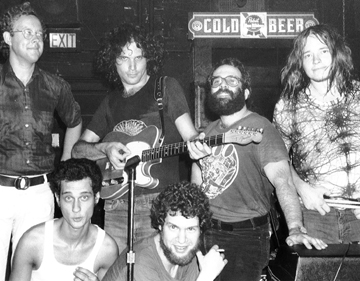 Kansas City,
Mo., is a former bandmate of Butch’s in
The Megatones, a raucous rockabilly and
rhythm ‘n’ blues band that ruled Lincoln
from 1973 to 1976, once opening for
bluesman Freddie King and frequently
holding court in the early days of the
Zoo Bar. Kansas City,
Mo., is a former bandmate of Butch’s in
The Megatones, a raucous rockabilly and
rhythm ‘n’ blues band that ruled Lincoln
from 1973 to 1976, once opening for
bluesman Freddie King and frequently
holding court in the early days of the
Zoo Bar.
Dye
fondly remembers Butch’s unique outlook
on life.
“When
you entered Butchworld, he had this
weird little, rarified environment. On
one hand, he was able to do everything
on his own terms. I’m a spoiled, only
child, too, so we had that in common,”
Dye said. “The thing about Butch was
that even though he saw the world
through his own rose-colored glasses, he
was always very generous and outgoing
and friendly towards other people. He
wasn’t a selfish man, at all. He was
self-involved, but he was not selfish.”
The two
met in the early ‘70s, when Berman was a
member of a band called The
Kaleidoscope. Because Butch had
inherited his family’s wealth, “he lived
in this little world, like, ‘I am the
emperor of my domain and nothing
challenges me.’ He hardly ever had to do
a job in his life,” yet he kept busy
collecting records and playing music,
even when bandmates proved difficult to
work with, Dye said. “One of the things
that impressed me about Butch is that he
didn’t like being angry or mad at
people. He wanted to find a way to get
away from it.”
Butch
had a 1975 cassette tape recording of
The Megatones performing at Little Bo’s,
a notorious Cornhusker Highway club in
Lincoln. In recent years, he dubbed it
to CD and gave Dye a copy.
“I’ve
put it on a couple times and thought,
‘Wow, this isn’t just nostalgia. We were
ass-kickin’.’ The sound quality is just
OK, but we sound like the MC5.” The two
also shared the bandstand in The
Excessives from 1980 to 1981, a rock ‘n’
roll experience Dye remembers fondly.
“That
was pretty much his band, he was leading
the group, and he was always an utterly
reasonable, pleasure to work with,” he
said. “He was always very organized,
knew what was going on. And, he was
always a very fair-minded guy. He wanted
to be a fair-minded person, as a
bandleader and just as a person.”
Another
thing they had in common was collecting
records.
“Over
the years, we were always trying to turn
each other on to things,” Dye said. A
visit to Butch’s house would eventually
turn to a listening session that
involved an exchange of obscure 45s.
“Sometimes I would bring stuff over for
him, and he would be interested in that.
He was open to other people bringing
stuff to him, as well. He was more of a
hardcore collector than I was. I used to
be more of a collector than I am now,
but Butch never let up.”
Most
memorable for Dye was Butch’s
thoughtfulness.
“Over
the years, I can’t tell you how many
times he would remember my birthday or
give me some little gift and say, ‘I
found this 45 and thought of you. Here.’
It was not just with me. He was one of
the most thoughtful people I’ve ever
known.”
Dye also
remembers Butch as a friendly
conversationalist, even with people he
hardly knew. After moving to Kansas City, he would occasionally return to
visit family and friends.
“One of
those times I was in town, my mom said,
‘Oh, I ran into Butch Berman the other
day at the grocery store. I could barely
get away from him. He wanted to talk and
talk and talk about all kinds of things.
What a nice fella, but boy he can talk!’
She got a kick out of Butch.”
Karrin Allyson’s association with Berman Music Foundation is the longest
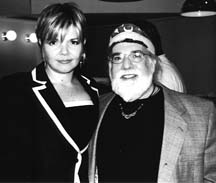 one on record,
beginning with a March 1995 booking at
the Zoo Bar in Lincoln. The foundation
brought her back to the Capital City
numerous times to play the Zoo Bar, a
now-defunct club called Huey’s and
eventually a concert performance in
November 2001 at the Lied Center for
Performing Arts, where Allyson was
accompanied by a Kansas City rhythm
section and string players from the
Lincoln Symphony Orchestra. one on record,
beginning with a March 1995 booking at
the Zoo Bar in Lincoln. The foundation
brought her back to the Capital City
numerous times to play the Zoo Bar, a
now-defunct club called Huey’s and
eventually a concert performance in
November 2001 at the Lied Center for
Performing Arts, where Allyson was
accompanied by a Kansas City rhythm
section and string players from the
Lincoln Symphony Orchestra.
Berman
had first heard Allyson in Kansas City,
where she often performed at The Phoenix
Bar & Grill and at Jardine’s. He soon
found new venues for her to practice her
craft.
“He was
so avid about giving artists venues and
avenues to play,” Allyson said. “I was
in the club scene, the bar scene, every
day of my life, and he offered me one of
the first opportunities to actually play
for a real listening audience, like a
concert setting. It gives you a
different way to explore your art. He
was always interested in doing different
things. He was a very creative person,
and he was excited about stuff. He
always wanted to do more of something.
It was never less of something.”
Allyson
also met up with Berman when the
foundation covered the Topeka Jazz
Festival from the late 1990s until 2005.
After-hours parties in the hotel were
not uncommon, and Butch loved to be
there.
“He
always wanted to hang out,” Allyson
said. “I’m always on the road, so I’m
always trying to conserve energy a
little bit. I like to hang out too, but
I felt bad that I didn’t do it as
often as I would have liked to with
Butch. But we had our share.”
Russ
Dantzler
and Berman were still in there teens
when they met in 1968. A
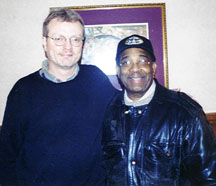 resident of New
York City for many years, Dantzler
operates Hot Jazz Management and
Production and has worked with jazz
artists Claude “Fiddler” Williams, Benny
Waters, Earl May and many others. resident of New
York City for many years, Dantzler
operates Hot Jazz Management and
Production and has worked with jazz
artists Claude “Fiddler” Williams, Benny
Waters, Earl May and many others.
When he
graduated from high school, Dantzler
moved into a house in Lincoln with three
roommates, all women. One of them was
dating Berman, who would pick her up
there. The two got to know each other
better.
“He had
a passion for turning people onto
things, whatever they were,” Dantzler
said. “He also had a passion for
discovering new things. I don’t know
which was greater, sharing it or finding
it himself. That was one of the neatest
things about him, and that rang true
practically every time I saw him. He had
some new band or some thing new
that he had to share.”
Like
many others who frequented the Zoo Bar
and other rock venues in the mid-‘70s,
Dantzler loved The Megatones and
Berman’s rockabilly piano playing.
“That
was the only band in Lincoln that made
me want to dance just about every time I
heard them. And, I’m not a good dancer.
I loved Butch’s keyboards. I loved his
guitar playing, but I really loved his
keyboard work.”
Because
of Dantzler’s long residence in New York
City and his contacts with jazz
musicians, Butch often called on him for
long-distance help in making
arrangements or helping with publicity.
At times, Dantzler found himself at the
mercy of Butch’s jazz obsessions and
incapable of delivering exactly what
Butch wanted. In the weeks before
Berman’s death, they talked about
organizing a benefit concert for Norman
Hedman, leader of the Latin jazz group
Tropique and a longtime friend and
consultant of the Berman Music
Foundation. Hedman also is having health
problems related to cancer.
Dantzler
said his final phone conversation with
Berman illustrated Butch’s generosity
and thoughtfulness.
“I’m
still kind of knocked out by the last
conversation, where it was all about
helping someone else. He actually called
me twice one week before he died, and it
was about helping Norman, of course.”
It was
Dantzler who introduced Butch to singer
Kendra Shank in New York City in
1995.
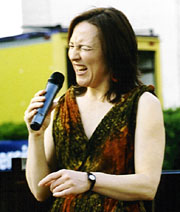 “I was
building a following in New York at that
time,” Shank recalled. “Russ was finding
every way possible for me to sit in with
musicians and meet musicians and expand
my presence on the New York jazz scene.
Butch heard me sing, and I guess he
really liked what he heard.” “I was
building a following in New York at that
time,” Shank recalled. “Russ was finding
every way possible for me to sit in with
musicians and meet musicians and expand
my presence on the New York jazz scene.
Butch heard me sing, and I guess he
really liked what he heard.”
A few
months later, Berman booked Shank as
part of a New York All-Stars performance
in August 1995 at the Zoo Bar in
Lincoln, with a side trip to Kansas City
for another gig. The all-star band
included Jaki Byard on piano, Jimmy
Knepper on trombone, Claude “Fiddler”
Williams on violin, Earl May on bass and
Jackie Williams on drums.
“A whole
lot of things came together out of that
one trip. It was sort of a blossoming of
a whole bunch of events that really
propelled my career forward,” Shank
said. “I just remember being so honored
to be included because that was pretty
early in my jazz career. To be included
in something that was being called an
‘all-star’ event was very flattering and
humbling.”
When
Butch was in NYC, the two would get
together for dinner, to check out a jazz
club or just have “long, long talks
about everything under the sun—life,
relationships, music. I always
appreciated his passion. It just seemed
he lived his life every second. He never
passed up a moment to enjoy his life.”
Shank
was especially impressed with his
burning desire to use his philanthropy
to make good things happen.
“I feel
really blessed to have been one of the
people that he chose to support. It’s
meant so much to me. You know how hard
it is for artists. You know what this
life is like. You have no financial
security, no job security. You’re doing
this thing that means the world to you,
that’s a spiritual path as much as
anything. You put yourself out there,
not knowing whether anyone is going to
give a damn. When someone like that
supports you by producing me in concert
a few times, that’s supporting my art.”
Shank
also witnessed and understood Berman’s
zeal to introduce audiences to
unfamiliar artists.
“One of
the things I really admired about Butch
is the way he seemed to have a vision
and a sense of a mission and how he
would bring artists to Lincoln who might
not otherwise have been presented there,
who might not have been in tune or in
keeping with the general tastes of the
audiences there,” she said. “He didn’t
waver when he had a belief in
something. I felt he was a person of
great integrity. Maybe he was just
stubborn. He was a jazz evangelist.”
Gerald Spaits,
a Kansas City bassist and
BMF
consultant, met Berman at the
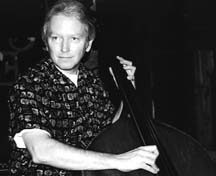 Topeka
Jazz Festival in the late 1990s. After
the Russ Long Trio CD “Never Let Me Go”
had been recorded in 2001, Spaits turned
to Berman as one of several possible
backers who would help to bankroll the
release. Instead, he put up all the
money necessary to issue the release. Topeka
Jazz Festival in the late 1990s. After
the Russ Long Trio CD “Never Let Me Go”
had been recorded in 2001, Spaits turned
to Berman as one of several possible
backers who would help to bankroll the
release. Instead, he put up all the
money necessary to issue the release.
The trio
visited Lincoln and got better
acquainted with Butch, always a
requirement for his love of networking
and camaraderie. The BMF later booked
the trio—and other bands that utilized
Spaits’ bass prowess—at P.O. Pears in
Lincoln. Other gigs followed at Jazz in
June and in planning the 2005 Topeka
Jazz Festival, for which Berman served
as music director. Eventually, Spaits
and his wife, Leslie, became BMF
consultants.
“He was
a unique individual,” Spaits said. “He
put it all out there. He didn’t mince
any words. If he didn’t like something,
he’d let you know. It’s like he would
have to clear the air once in a while.
That was just Butch.”
Dave
Fowler
first heard of Berman many years ago,
when he read a music
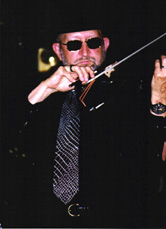 magazine article
that singled out a Lincoln guitar player
for his “letter-perfect vocabulary of
Scotty Moore,” the legendary guitarist
best known for backing Elvis Presley in
the early part of his career. magazine article
that singled out a Lincoln guitar player
for his “letter-perfect vocabulary of
Scotty Moore,” the legendary guitarist
best known for backing Elvis Presley in
the early part of his career.
“That
was my introduction to Butch. He was an
expert in that straight-ahead,
rockabilly guitar style.”
Fowler,
a violinist, and Butch struck up a
friendship over the years and eventually
were occasional bandmates in an early
version of Charlie Burton’s band, the
Dorothy Lynch Mob. But Fowler also took
an interest in the Berman Music
Foundation’s collection of rare music
videos by such artists as Claude
“Fiddler” Williams and a group of jazz
all-stars who the foundation brought to
Lincoln’s Zoo Bar in the mid 1990s.
“The
resources that he put together in that
museum are just incredible,” Fowler
said. “It ranges from obscure Homer and
Jethro 45s to the very first time that
(jazz pianist) Eldar Djangirov played in
Lincoln. He covered so many different
areas of jazz.”
One of
the things that Fowler and Butch had in
common was a love of “gypsy jazz,” that
hybrid swing style made popular by
guitarist Django Reinhardt and violinist
Stephane Grappelli, founding members of
the Hot Club of Paris quintet in the
1930s.
“Right
up until the last weeks that I saw him,
we were still planning some musical
ideas that he wanted to carry out. He
had brought the Hot Club of San
Francisco back. He was thinking of doing
that again and having some local people
play as part of a gypsy jazz festival.
“I find
it very hard to think that he’s not
around.”
top |
|
Memorial
BMF founder Butch Berman, 58, died Jan.
31 |
|
Dear readers: In case you
missed the news stories on the passing
of Butch Berman, or wish to know more
details of his life, we offer the piece
below, which appeared in a slightly
different form in the Feb. 1 Lincoln
Journal Star.
By Tom Ineck
LINCOLN,
Neb.—Byron L. “Butch” Berman, 58,
founder of the Berman Music Foundation
and veteran of many Lincoln rock bands,
died at home the evening of Jan. 31,
after a four-month struggle with brain
cancer.
Since
its inception in spring 1995, the BMF
has sponsored dozens of jazz concerts
throughout the Midwest, including
appearances in Lincoln by pianists
George Cables, Eldar Djangirov, Kenny
Barron, Monty Alexander, and Joe
Cartwright; Norman Hedman’s Tropique;
the Hot Club of San Francisco; singers
Karrin Allyson, Kendra Shank, Giacomo
Gates, Sheila Jordan, and Kevin
Mahogany; saxophonists: Bobby Watson,
Joe Lovano, and Greg Abate; trumpeter
Claudio Roditi; guitarist Jerry Hahn;
bassist Christian McBride; the Mingus
Big Band and many others.
The
foundation and the Nebraska Jazz
Orchestra are collaborating on a May 23
tribute to the music of the late Kansas
City pianist and composer Russ Long.
Over the years, the foundation has
sponsored many groups for the Jazz in
June concerts in Lincoln, and right up
to Butch’s death he was working on a
lineup for this year’s series. We will
share details as they become available.
Berman’s
varied interests in music, however, go
back a lot farther than the jazz
foundation. At age seven, he was taking
lessons in classical piano. An only
child raised in 1950s Lincoln, the
precocious audiophile had collected 300
rock ‘n’ roll 45s by age 10. He also had
begun playing guitar and improvising on
the keyboard.
Berman
played in a succession of local rock
bands in the early 1960s, including the
Modds, who were inducted into the
Nebraska Rock ‘n’ Roll Hall of Fame. He
grew his hair long and considered
dropping out of school. At age 15, he
was sent to Wentworth Military Academy,
where, instead of discipline, the young
cadet was introduced to all the thrills
and excitement of Kansas City, just 40
miles down the road.
By the
early 1970s, Berman was back on the rock
scene in Lincoln, playing guitar and
keyboards in a number of bands,
including such regional favorites as The
Megatones and Charlie Burton & Rock
Therapy. He even toured Europe with
rockabilly legend Sleepy LaBeef. The
1980s found him in San Francisco,
hanging out at Jack’s Record Cellar,
playing with Roy Loney & the Phantom
Movers and beginning to acquire an
interest in jazz.
Returning to Lincoln in the early 1990s,
he continued to build a large and
diverse record collection and began an
eight-year stint as a jazz deejay,
hosting “Bop Street Theater,” “Reboppin’,”
“Reboppin’ Revisited” and “Soul Stew” on
KZUM Community Radio. He also maintained
his rock music career, most recently
with the Cronin Brothers, with whom he
performed his last gig Dec. 30 at the
Zoo Bar.
In May
2003, Berman married his soul mate,
Grace, whom he often referred to as his
“saving Grace” and “loving angel.”
Together, they traveled to New York
City, Chicago, San Francisco, Kansas
City, Mo., and elsewhere and especially
enjoyed going to concerts and dining
with friends. Butch enjoyed interacting
with Grace’s sons, Jenom and Bahji. He
also had a lifelong love and respect for
animals, wild and domestic, and adopted
many dogs and cats over the years, most
recently cat Muggles and dog Peanut.
top |
|
Concert Preview
Berman inspired May 23 Russ Long tribute
with NJO |
|
By Tom Ineck
It was Butch Berman who conceptualized
the May 23 concert that will pair the
Nebraska Jazz Orchestra and a coterie of
Kansas City musicians for a tribute to
the music of late KC pianist and
composer Russ Long.
Through the auspices of the Berman
Music Foundation, he funded the 2006
project to document Long’s compositions
with new arrangements for septet and a
recording entitled “Time to Go: The
Music of Russ Long.” Long died Dec. 31,
2006, just weeks after the CD’s release.
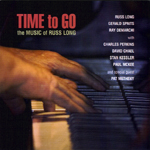 The recording had been selling well in
the Kansas City area, but Berman wanted
to introduce the music to a Lincoln
audience. He approached the Nebraska
Jazz Orchestra, with whom the BMF had
collaborated in bringing many guest
artists, including saxophonists Bobby
Watson and Greg Abate, trumpeter Claudio
Roditi and singer Giacomo Gates. The recording had been selling well in
the Kansas City area, but Berman wanted
to introduce the music to a Lincoln
audience. He approached the Nebraska
Jazz Orchestra, with whom the BMF had
collaborated in bringing many guest
artists, including saxophonists Bobby
Watson and Greg Abate, trumpeter Claudio
Roditi and singer Giacomo Gates.
“Butch had just finished this CD project
with Russ, and he was all excited about
that,” said Ed Love, NJO music director.
“He said he would be very excited to
fund a concert Russ Long’s music and all
new arrangements and even bring up a
rhythm section from Kansas City.”
Love chose three tunes with interesting
chord changes that NJO musicians would
enjoy playing and listeners would enjoy
hearing. Bandmates Mark Benson, Dave
Sharp and Peter Bouffard will arrange
“Time to Go,” “Meatloaf” (based on the
changes of “I Got Rhythm”) and “I Don’t
Care Who.”
Berman also broached the subject with
Gerald Spaits, Kansas City bassist and a
BMF consultant. It was Spaits who had
spearheaded the “Time to Go”
arrangements and recording.
“It was really Butch’s idea,” Spaits
said of the plan to involve the NJO. “He
asked me if we could do some of those
arrangements for a big band and do it
with NJO. I thought that would be a
great idea. It kind of came out of the
blue, because it’s not something that I
would have thought of, although I think
it’s appropriate, and it’s something
that Russ would have really liked.”
Spaits also will arrange three tunes for
the NJO concert, “Parallel,” “Woodland
Park” and “Can City.”
“We’ll see what happens,” he said with
some trepidation. “It’s going to be
really interesting to see because I have
no idea what they’re going to do with
the three tunes. I picked three that I
thought would make good arrangements. I
didn’t want to do all six of them, just
because that’s a lot of work. It’s a
long process for me. I’ve done big-band
arrangements, but I haven’t done one for
10 or 15 years.”
Kansas City will be well represented at
the May 23 performance. Accompanying
Spaits for the trip are pianist Roger
Wilder, drummer Ray DeMarchi and reed
virtuoso Charles Perkins.
“I’m excited to work with those
rhythm-section guys from Kansas City,”
Love said. “They’re just amazing
musicians. It will be quite fun.” In
addition to their work with the NJO, the
KC musicians will perform a short set of
Long’s tunes as a quartet.
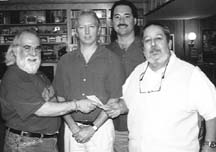 Butch was a
big fan of Long's, funding the
release of 2001’s “Never Let Me Go,” a
trio recording with bassist
Spaits and drummer DeMarchi. He was
attracted by Long’s sense of ironic wit,
his bluesy vocalizing, his modesty and,
of course, his diverse talents as
composer, song interpreter, pianist and
singer. An important link in KC jazz
history, Long had known or worked with
some of the region’s greats, including
Eddy “Cleanhead” Vinson, Claude
“Fiddler” Williams, Jay McShann and
Frank Smith. Butch was a
big fan of Long's, funding the
release of 2001’s “Never Let Me Go,” a
trio recording with bassist
Spaits and drummer DeMarchi. He was
attracted by Long’s sense of ironic wit,
his bluesy vocalizing, his modesty and,
of course, his diverse talents as
composer, song interpreter, pianist and
singer. An important link in KC jazz
history, Long had known or worked with
some of the region’s greats, including
Eddy “Cleanhead” Vinson, Claude
“Fiddler” Williams, Jay McShann and
Frank Smith.
A longtime friend and bandmate of
Long’s, Spaits sees the Lincoln concert
as a way to educate more people about
the composer’s music.
“I think it’s significant because it is
someone who didn’t get his due,” Spaits
said. “We’re celebrating Russ’s talent.
He made three recordings, and this last
one we got in just before he passed. It
documents the fact that he was a major
talent, in my opinion. I also think he
was a major contributor to Kansas City
jazz.”
Both Russ Long CDs are nearly sold out
and may be reissued with help from the
BMF, a subject of conversation just
weeks before Butch’s death.
Editor's Note: To read more
about Russ Long and his music in an
interview the BMF did with him shortly
before his death
click here. To read about the CD
release party for "Time to Go"
click here.
For a CD review
click here.
top |
|
Tomfoolery
Berman workplace was also a jazz
playground |
|
By Tom Ineck
LINCOLN, Neb.—Work and play were all the
same to Butch Berman, who in the spring
of 1995 formed the Berman Music
Foundation to “protect and promote
unique forms of jazz music” during his
lifetime and beyond. With that mission
statement as its legal underpinning, the
foundation became not only Butch’s
workplace, but his playground—a jazz
sandbox where he could build majestic
castles or just romp with his friends.
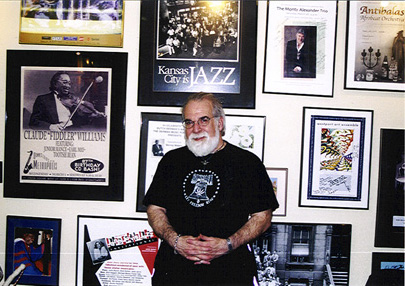 Since
my association with the foundation began
as a writer in early 1996, Butch allowed
me to do what I enjoy most, listening to
and writing about jazz. Since the
mid-1980s, I had been doing that for the
Lincoln Journal Star newspaper—at least,
as often as I could justify it to my
editors. Butch let me indulge my passion
for jazz to the extreme, a passion he
shared. Since
my association with the foundation began
as a writer in early 1996, Butch allowed
me to do what I enjoy most, listening to
and writing about jazz. Since the
mid-1980s, I had been doing that for the
Lincoln Journal Star newspaper—at least,
as often as I could justify it to my
editors. Butch let me indulge my passion
for jazz to the extreme, a passion he
shared.
Since
then, I have assumed the additional
roles of editor and webmaster for the
BMF. In the last five years, since the
periodical newsletter went to a
completely digital publication, I worked
especially closely with Butch, and I
will miss our collaborations. To cover
the latest in regional jazz, much of
which was being presented by the Berman
Music Foundation, we traveled to
festivals in Kansas City, Mo., and
Topeka, Kan., and met at local venues
like the Lied Center for Performing
Arts, the Cornhusker Hotel, the Embassy
Suites, Westbrook Recital Hall, the Zoo
Bar, the outdoor Jazz in June concert
series, the Royal Grove, the Downtown
Senior Center and the now-defunct P.O.
Pears, Café de Mai, Huey’s, Ebenezer’s
and Prime Time.
One of
the most enjoyable musical adventures
was a road trip last summer to the
Brownville Concert Hall to hear singer
Klea Blackhurst with pianist Billy
Stritch, bassist Gerald Spaits and
drummer Ray DeMarchi. My wife, Mary
Jane, and I joined Butch and his wife,
Grace, for a pleasant Sunday afternoon
of good conversation and good music.
Working
with Butch could be thrilling,
educational, intoxicating,
unpredictable, exasperating, even
maddening. When I began editing all
stories and he had gotten his first home
(laptop) computer, he would invite me
over to his basement office to take
dictation. He would scribble his stories
on paper beforehand, then attempt to
read them back to me as I typed
furiously on his unfamiliar keyboard,
while his latest musical find was
blaring on the stereo, the dogs were
trying to lick my face, and the
complementary wine and other party
favors were beginning to go to my head.
With Butch, work and play were always
interchangeable.
Eventually, he learned how to write his
stories on the computer and e-mail them
to me for editing. It cut down on the
work time, but it wasn’t nearly as
memorable—or as much fun.
Like
many who grew up in Lincoln, I became
aware of Butch Berman as a musician,
first seeing him perform at the Zoo Bar
in 1974 with The Megatones, one of the
great Midwest rock ‘n’ roll bands of
that era. He was a manic piano player,
perfectly suited to The Megatones’
raucous rockabilly antics, which were
inspired and led by the frenzied
singer-songwriter Charlie Burton.
Butch
continued his rock ‘n’ roll career, and
I would again hear him with Charlie
Burton & Rock Therapy, Pinky Black and
the Excessives, The Tablerockers and, in
more recent years, Charlie Burton and
the Dorothy Lynch Mob and The Cronin
Brothers, his final band.
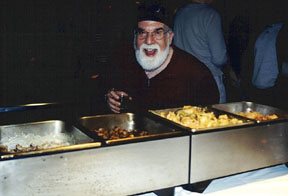 When
Butch launched the foundation in 1995,
he called me at the Journal Star to ask
me to write a story about it. We met for
an interview and I wrote the story, the
first local coverage for the BMF. In
retrospect, it seems inevitable that we
would work together—and play together. When
Butch launched the foundation in 1995,
he called me at the Journal Star to ask
me to write a story about it. We met for
an interview and I wrote the story, the
first local coverage for the BMF. In
retrospect, it seems inevitable that we
would work together—and play together.
Butch
and I shared the astrological water sign
of Pisces, and it formed a bond that was
significant for both of us. He may not
have considered himself a guru, but I
do. To everyone he met and everyone he
worked with, he taught the simple
lesson: Enjoy life!
I hope
to have many more memorable experiences
with the Berman Music Foundation, and
Butch’s spirit will be present in
everything we do. May the music never
end.
For a glimpse into the future of the
Berman Music Foundation, read Tony
Rager’s column here.
top |
|
Memorial
We just lost one of the best – R.I.P., Earl May |
|
Editor's Note: This was the last
story that Butch Berman wrote. Like so
many other things about Butch, it
illustrates his thoughtfulness, even in
the final stages of his own terminal
illness.
By Butch Berman
![Earl May [Courtesy Photo]](media/308earlmay.jpg) After
losing the wonderful and talented likes
of the late great Frank Morgan and then
Oscar Peterson at the end of 2007, I had
high hopes that 2008 would bring more
joy than sorrow. After
losing the wonderful and talented likes
of the late great Frank Morgan and then
Oscar Peterson at the end of 2007, I had
high hopes that 2008 would bring more
joy than sorrow.
Alas,
one of the dearest, oldest friends and
greatest gentlemen I’ve dealt with since
I’ve been involved with the fabulous
world of jazz the past 20-plus years
passed away Jan. 4 from a heart attack
at the age of 80. I’m talking about the
legendary, left-handed Earl May, one of
the best bassists in jazz history.
I met
Earl through my old Lincoln buddy Russ
Dantzler, whose Hot Jazz Management
moved Russ to NYC many years ago. He
lined me up to do my first interview on
my original KZUM “Reboppin’” radio show
during the early ‘80. I treasure those
cassette phone interviews transferred to
CDs and hope to make them available to
the public sometime in the near future.
Earl
told of his early start in music as a
youngster listening to old jazz records
at his aunt’s in New York before moving
to the Sugar Hill section of Harlem and
finally making music his career.
Starting on the violin, and later
wanting to be a drummer, he somehow got
turned on to the upright bass in high
school. Being a natural, with one of the
best ears in the biz, he soon became one
of the first-call players to accompany
some of the all-time greats—everyone
from Charlie Parker and John Coltrane to
Carmen McRae, Gloria Lynne (all of the
female vocalists raved of his ability to
play behind them and bring out their
finest recorded and live performances),
Dr. Billy Taylor, Dizzy
Gillespie,
Junior Mance,
Barry Harris and Doc Cheatham (those
fantastic Sunday brunches with the sweet
Doc at Sweet Basil’s), just to name a
few. He led and fronted his own groups
towards the later portion of his long
tenure in music, recording many fine CDs
for Matt Dobner’s
Arbor Records that are all available and
should be required for any true jazz
record collector.
I was
lucky enough to finally meet, dine and
catch Earl live in New York playing with
other artists whom I grew to know, love
and call friends, such as Claude
“Fiddler” Williams, Benny Waters, and Al
Casey, to name a few that have passed on
since then. I even got to book Earl at
our Lincoln, Neb., hometown Zoo Bar when
I first started the Berman Music
Foundation. We called the group the New
York All-Stars, which featured my good
buddy Jackie Williams on drums, from the
Mingus days
the now-departed pianist
Jaki
Byard,
trombone master Jimmy
Knepper, and
one of the first appearances of one of
New York’s finest female vocalists
today, Kendra Shank. I have videos of
those shows that, like my interview, I
would love to make public for all his
vast array of friends and fans to
behold. Hanging with Earl and his lovely
wife Lee in my hometown will be
remembered and carried in my heart
forever.
I can
close my eyes and still picture Earl
schlepping his bass all over Manhattan,
dealing with parking his car, getting to
whatever gig he had and, as always,
playing his ass off with more dignity,
finesse, and pure raw talent through his
50s, into his 60s and right up until he
expired at 80.
We
should all be as fortunate to live out
our dreams and goals with such passion
and pleasure. I will always love you,
Earl, and remember the good times for
the rest of my life and enjoy the
incredible legacy of recorded music you
left behind for us all cherish forever.
You truly were one of the best. God
bless you, and rest in peace in jazz
heaven for eternity.
top |
|
|
|
Editor’s Note:
At your request, we will mail a printed version
of the newsletter. The online newsletter also is available at this
website in PDF format for printing. Just click here: Newsletter
|
|

 Kansas City,
Mo., is a former bandmate of Butch’s in
The Megatones, a raucous rockabilly and
rhythm ‘n’ blues band that ruled Lincoln
from 1973 to 1976, once opening for
bluesman Freddie King and frequently
holding court in the early days of the
Zoo Bar.
Kansas City,
Mo., is a former bandmate of Butch’s in
The Megatones, a raucous rockabilly and
rhythm ‘n’ blues band that ruled Lincoln
from 1973 to 1976, once opening for
bluesman Freddie King and frequently
holding court in the early days of the
Zoo Bar. one on record,
beginning with a March 1995 booking at
the Zoo Bar in Lincoln. The foundation
brought her back to the Capital City
numerous times to play the Zoo Bar, a
now-defunct club called Huey’s and
eventually a concert performance in
November 2001 at the Lied Center for
Performing Arts, where Allyson was
accompanied by a Kansas City rhythm
section and string players from the
Lincoln Symphony Orchestra.
one on record,
beginning with a March 1995 booking at
the Zoo Bar in Lincoln. The foundation
brought her back to the Capital City
numerous times to play the Zoo Bar, a
now-defunct club called Huey’s and
eventually a concert performance in
November 2001 at the Lied Center for
Performing Arts, where Allyson was
accompanied by a Kansas City rhythm
section and string players from the
Lincoln Symphony Orchestra. resident of New
York City for many years, Dantzler
operates Hot Jazz Management and
Production and has worked with jazz
artists Claude “Fiddler” Williams, Benny
Waters, Earl May and many others.
resident of New
York City for many years, Dantzler
operates Hot Jazz Management and
Production and has worked with jazz
artists Claude “Fiddler” Williams, Benny
Waters, Earl May and many others.
 “I was
building a following in New York at that
time,” Shank recalled. “Russ was finding
every way possible for me to sit in with
musicians and meet musicians and expand
my presence on the New York jazz scene.
Butch heard me sing, and I guess he
really liked what he heard.”
“I was
building a following in New York at that
time,” Shank recalled. “Russ was finding
every way possible for me to sit in with
musicians and meet musicians and expand
my presence on the New York jazz scene.
Butch heard me sing, and I guess he
really liked what he heard.” Topeka
Jazz Festival in the late 1990s. After
the Russ Long Trio CD “Never Let Me Go”
had been recorded in 2001, Spaits turned
to Berman as one of several possible
backers who would help to bankroll the
release. Instead, he put up all the
money necessary to issue the release.
Topeka
Jazz Festival in the late 1990s. After
the Russ Long Trio CD “Never Let Me Go”
had been recorded in 2001, Spaits turned
to Berman as one of several possible
backers who would help to bankroll the
release. Instead, he put up all the
money necessary to issue the release. magazine article
that singled out a Lincoln guitar player
for his “letter-perfect vocabulary of
Scotty Moore,” the legendary guitarist
best known for backing Elvis Presley in
the early part of his career.
magazine article
that singled out a Lincoln guitar player
for his “letter-perfect vocabulary of
Scotty Moore,” the legendary guitarist
best known for backing Elvis Presley in
the early part of his career. The recording had been selling well in
the Kansas City area, but Berman wanted
to introduce the music to a Lincoln
audience. He approached the Nebraska
Jazz Orchestra, with whom the BMF had
collaborated in bringing many guest
artists, including saxophonists Bobby
Watson and Greg Abate, trumpeter Claudio
Roditi and singer Giacomo Gates.
The recording had been selling well in
the Kansas City area, but Berman wanted
to introduce the music to a Lincoln
audience. He approached the Nebraska
Jazz Orchestra, with whom the BMF had
collaborated in bringing many guest
artists, including saxophonists Bobby
Watson and Greg Abate, trumpeter Claudio
Roditi and singer Giacomo Gates. Butch was a
big fan of Long's, funding the
release of 2001’s “Never Let Me Go,” a
trio recording with bassist
Spaits and drummer DeMarchi. He was
attracted by Long’s sense of ironic wit,
his bluesy vocalizing, his modesty and,
of course, his diverse talents as
composer, song interpreter, pianist and
singer. An important link in KC jazz
history, Long had known or worked with
some of the region’s greats, including
Eddy “Cleanhead” Vinson, Claude
“Fiddler” Williams, Jay McShann and
Frank Smith.
Butch was a
big fan of Long's, funding the
release of 2001’s “Never Let Me Go,” a
trio recording with bassist
Spaits and drummer DeMarchi. He was
attracted by Long’s sense of ironic wit,
his bluesy vocalizing, his modesty and,
of course, his diverse talents as
composer, song interpreter, pianist and
singer. An important link in KC jazz
history, Long had known or worked with
some of the region’s greats, including
Eddy “Cleanhead” Vinson, Claude
“Fiddler” Williams, Jay McShann and
Frank Smith. Since
my association with the foundation began
as a writer in early 1996, Butch allowed
me to do what I enjoy most, listening to
and writing about jazz. Since the
mid-1980s, I had been doing that for the
Lincoln Journal Star newspaper—at least,
as often as I could justify it to my
editors. Butch let me indulge my passion
for jazz to the extreme, a passion he
shared.
Since
my association with the foundation began
as a writer in early 1996, Butch allowed
me to do what I enjoy most, listening to
and writing about jazz. Since the
mid-1980s, I had been doing that for the
Lincoln Journal Star newspaper—at least,
as often as I could justify it to my
editors. Butch let me indulge my passion
for jazz to the extreme, a passion he
shared. When
Butch launched the foundation in 1995,
he called me at the Journal Star to ask
me to write a story about it. We met for
an interview and I wrote the story, the
first local coverage for the BMF. In
retrospect, it seems inevitable that we
would work together—and play together.
When
Butch launched the foundation in 1995,
he called me at the Journal Star to ask
me to write a story about it. We met for
an interview and I wrote the story, the
first local coverage for the BMF. In
retrospect, it seems inevitable that we
would work together—and play together.![Earl May [Courtesy Photo]](media/308earlmay.jpg) After
losing the wonderful and talented likes
of the late great Frank Morgan and then
Oscar Peterson at the end of 2007, I had
high hopes that 2008 would bring more
joy than sorrow.
After
losing the wonderful and talented likes
of the late great Frank Morgan and then
Oscar Peterson at the end of 2007, I had
high hopes that 2008 would bring more
joy than sorrow.